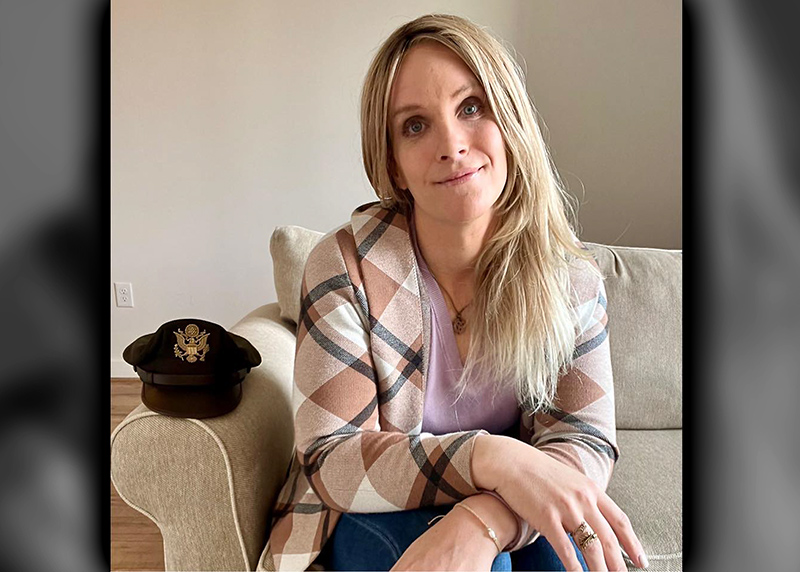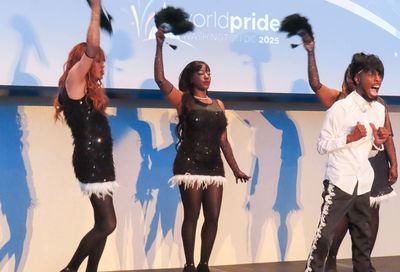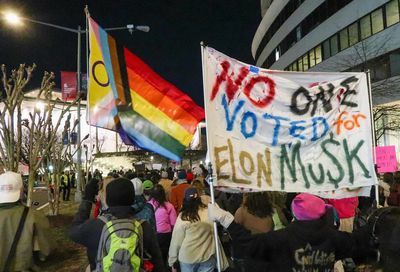Supreme Court Rules in Favor of Anti-Gay Website Designer
Court's 6-3 majority rules that Colorado's LGBTQ-inclusive nondiscrimination law infringes on wedding website designer's First Amendment rights.

The U.S. Supreme Court has ruled 6-3 in favor of a wedding website designer who sought a religious exemption from having to abide by Colorado’s nondiscrimination law, claiming that the law infringes upon her First Amendment right to free speech.
The designer, Lorie Smith, who runs her own business known as 303 Creative LLC, claims that her personal religious beliefs prevent her from creating wedding websites for same-sex couples, and asked that she be allowed to refuse to provide her services for same-sex marriages. She also sought to put up a disclaimer on her website indicating her refusal to create custom-made wedding websites for non-heterosexual marriages.
The Republican-appointed members of the court sided with Smith, finding that “the First Amendment prohibits Colorado from forcing a website designer to create expressive designs speaking messages with which the designer disagrees.”
“The framers designed the Free Speech Clause of the First Amendment to protect the ‘freedom to think as you will and to speak as you think,'” Justice Neil Gorsuch, a Trump appointee, wrote on behalf of the conservative majority, noting that past precedent finds that the First Amendment “protects an individual’s right to speak his mind regardless of whether the government considers his speech sensible and well intentioned or deeply ‘misguided.'”
“Ms. Smith’s websites will express and communicate ideas — namely, those that ‘celebrate and promote the couple’s wedding and unique love story’ and those that ‘celebrat[e] and promot[e]’ what Ms. Smith understands to be a marriage. Speech conveyed over the internet, like all other manner of speech, qualifies for the First Amendment’s protections,” Gorsuch continued. “…Ms. Smith intends to produce a final story for each couple using her own words and original artwork. While Ms. Smith’s speech may combine with the couple’s in a final product, an individual ‘does not forfeit constitutional protection simply by combining multifarious voices’ in a single communication.
“Ms. Smith seeks to engage in protected First Amendment speech; Colorado seeks to compel speech she does not wish to provide. As the Tenth Circuit observed, if Ms. Smith offers wedding websites celebrating marriages she endorses, the State intends to compel her to create custom websites celebrating other marriages she does not,” Gorsuch wrote on behalf of the court. “If [Smith] wishes to speak, she must either speak as the State demands or face sanctions for expressing her own beliefs, sanctions that may include compulsory participation in ‘remedial . . . training,’ filing periodic compliance reports, and paying monetary fines. That is an impermissible abridgement (sic) of the First Amendment’s right to speak freely.”
In finding for Smith, the court reverses a ruling by the 10th U.S. Circuit Court of Appeals, which ruled against Smith and found that Colorado has an interest in protecting LGBTQ people from discrimination. That ruling upheld a lower court’s decision in favor of the state.
In a scathing dissent, Justice Sonia Sotomayor, an Obama appointee, joined by Democratic-appointed Justices Elena Kagan and Ketanji Brown Jackson, slammed the conservative majority for a decision radically reverses past precedent.
“Five years ago, this Court recognized the ‘general rule’ that religious and philosophical objections to gay marriage ‘do not allow business owners and other actors in the economy and in society to deny protected persons equal access to goods and services under a neutral and generally applicable public accommodations law,'” Sotomayor said, citing the court’s ruling in the Masterpiece Cakeshop case.
“The Court also recognized the ‘serious stigma’ that would result if ‘purveyors of goods and services who object to gay marriages for moral and religious reasons’ were ‘allowed to put up signs saying “no goods or services will be sold if they will be used for gay marriages.”‘ Today, the Court, for the first time in its history, grants a business open to the public a constitutional right to refuse to serve members of a protected class.”
“Specifically, the Court holds that the First Amendment exempts a website design company from a state law that prohibits the company from denying wedding websites to same-sex couples if the company chooses to sell those websites to the public. The Court also holds that the company has a right to post a notice that says, ‘”no [wedding websites] will be sold if they will be used for gay marriages.”‘”
Sotomayor then elaborated on what constitutes a public accommodations law, and what the purpose of such laws is.
“A public accommodations law does not force anyone to start a business, or to hold out the business’s goods or services to the public at large,” Sotomayor wrote. “The law also does not compel any business to sell any particular good or service. But if a business chooses to profit from the public market, which is established and maintained by the state, the state may require the business to abide by a legal norm of nondiscrimination.
“The concept of a public accommodation thus embodies a simple, but powerful, social contract: A business that chooses to sell to the public assumes a duty to serve the public without unjust discrimination,” she added.
Sotomayor also argued that Colorado’s law prohibiting discrimination in public accommodations regulates conduct, not speech, and that it merely prohibits Smith from discriminating, or asserting that she intends to discriminate, in the future, against same-sex couples.
Lastly, she accused the conservative majority of setting a precedent that not only rolls back progress on LGBTQ rights, but may one day be used to justify discrimination against groups besides the LGBTQ community.
“Today is a sad day in American constitutional law and in the lives of LGBT people. The Supreme Court of the United States declares that a particular kind of business, though open to the public, has a constitutional right to refuse to serve members of a protected class. The Court does so for the first time in its history,” Sotomayor wrote.
“By issuing this new license to discriminate in a case brought by a company that seeks to deny same-sex couples the full and equal enjoyment of its services, the immediate, symbolic effect of the decision is to mark gays and lesbians for second-class status. In this way, the decision itself inflicts a kind of stigmatic harm, on top of any harm caused by denials of service. The opinion of the Court is, quite literally, a notice that reads: ‘Some services may be denied to same-sex couples.'”
” In this pivotal moment, the Court had an opportunity to reaffirm its commitment to equality on behalf of all members of society, including LGBT people. It does not do so,” Sotomayor continued. “Although the consequences of today’s decision might be most pressing for the LGBT community, the decision’s logic cannot be limited to discrimination on the basis of sexual orientation or gender identity.
“The decision threatens to balkanize the market and to allow the exclusion of other groups from many services. A website designer could equally refuse to create a wedding website for an interracial couple, for example,” she noted. “Yet the reason for discrimination need not even be religious, as this case arises under the Free Speech Clause. A stationer could refuse to sell a birth announcement for a disabled couple because she opposes their having a child. A large retail store could reserve its family portrait services for ‘traditional’ families. And so on. … There are many such stories, too many to tell here. And after today, too many to come.”
The high court’s decision raises the likelihood of similar First Amendment challenges to laws prohibiting discrimination against LGBTQ people, both at the local and state level.
It remains to be seen whether the 23 jurisdictions — including 21 states, the U.S. Virgin Islands and the District of Columbia — with laws prohibiting discrimination on the basis of sexual orientation or gender identity will proactively pass legislation creating “carve-outs” for religious objectors. It also remains unclear whether future challenges to nondiscrimination laws will effectively render them meaningless, if anyone can claim a religious or moral objection — however flimsy or disingenuous — to providing goods and services to LGBTQ people.
For the time being, however, it appears that the high court has established a new precedent, by which courts will likely abide, that states must grant a “free speech” exemption for individuals or businesses that specialize in “custom goods and services,” even if they purportedly open themselves up to the broader public for commerce.
LGBTQ advocates and allies criticized the court’s decision as eroding LGBTQ rights.
Kelley Robinson, the president of the Human Rights Campaign, blasted the decision as a “dangerous step backward” for LGBTQ rights by allowing some businesses to discriminate.
“Our nation has been on a path of progress — deciding over the course of many decades that businesses should be open regardless of race, disability or religion. Many states have expanded this promise to include sex, sexual orientation and gender identity — this is a deeply troubling crack in our progress and should be alarming to us all,” Robinson said. “People deserve to have commercial spaces that are safe and welcoming. This decision continues to affirm how radical and out-of-touch this Court is, especially when 80 percent of Americans support robust and LGBTQ+ inclusive nondiscrimination laws.
“Make no mistake, this case was manufactured by the Alliance for Defending Freedom to create a new license to discriminate against LGBTQ+ people,” she added. “Despite our opponents claiming this is a major victory, this ruling does not give unfettered power to discriminate. This decision does not mean that any LGBTQ+ person can be discriminated against in housing, employment or banking — those protections remain enshrined with federal law. The LGBTQ+ community is in a state of emergency where all levels of government are trying to erase us, but we will not let them erase us — we will fight back.”
Others argued that the court’s decision underscores the importance of enshrining as many LGBTQ nondiscrimination protections as possible in federal law, noting that opponents of LGBTQ rights will soon shift their focus from overturning inclusive public accommodations laws to chipping away at other legal protections.
“Without doubt, the LGBTQ+ community, after gaining historic protections thanks in no small part to their tireless activism, organizing and persistence face increasing threats to their ability to be fully protected citizens in our nation,” Analilia Mejia, the co-executive director of the Center for Popular Democracy Action, said in a statement. “As we stand in solidarity with the LGBTQ+ community, we know the threat of our MAGA court remains. Congress must act now before our civil rights are further eroded, and pass the Judiciary Act to expand the court.”
Sarah Kate Ellis, the president and CEO of GLAAD, alluded to reporting by The New Republic alleging that someone filed a fake request from a couple named “Stewart and Mike” asking Smith to create a website for their same-sex wedding.
According to The New Republic, the phone number, email address, and URL to the website of a designer named “Stewart” were included in the request, which Smith’s lawyers filed as evidence that their client was allegedly being “pressured” to create websites for same-sex weddings. But when reporter Melissa Gira Grant contacted Stewart using the information from the form included in the filing submitted by Smith’s legal team to the Supreme Court, he told her that he had never submitted an inquiry form demanding or asking for Smith’s services.
“If somebody’s pulled my information, as some kind of supporting information or documentation, somebody’s falsified that,” Stewart said, noting that he is married to a woman, with whom he has a child, and was not seeking to enter a same-sex marriage. “I wouldn’t want anybody to … make me a wedding website? I’m married, I have a child—I’m not really sure where that came from.”
In contrast to the apparently now debunked “hypothetical” case that Smith’s lawyers used to argue for an exemption from Colorado’s Anti-Discrimination Act, Ellis noted that Sotomayor, in her dissent, provided examples of real same-sex couples who had been discriminated against because of their sexual orientation and would be harmed by granting overly broad exemptions allowing businesses or service providers to discriminate against LGBTQ people.
“This decision will bring harm and stigma to LGBTQ families and is yet another example of a Court that is out of touch with the supermajority of Americans who believe in fundamental freedoms and know that discrimination is wrong,” Ellis said in a statement. “Businesses that are open to the public should serve all in the public.
“Not one LGBTQ couple sought [303 Creative’s] services so this case is a massive abuse of the judicial system and part of a coordinated effort from groups like the Alliance Defending Freedom to leverage corrupt extremist justices to roll back rights of marginalized Americans,” Ellis concluded. “The decision does not reflect a country that supports LGBTQ people and recognizes our relationships are equal, valid and valued.”
Support Metro Weekly’s Journalism
These are challenging times for news organizations. And yet it’s crucial we stay active and provide vital resources and information to both our local readers and the world. So won’t you please take a moment and consider supporting Metro Weekly with a membership? For as little as $5 a month, you can help ensure Metro Weekly magazine and MetroWeekly.com remain free, viable resources as we provide the best, most diverse, culturally-resonant LGBTQ coverage in both the D.C. region and around the world. Memberships come with exclusive perks and discounts, your own personal digital delivery of each week’s magazine (and an archive), access to our Member's Lounge when it launches this fall, and exclusive members-only items like Metro Weekly Membership Mugs and Tote Bags! Check out all our membership levels here and please join us today!
























You must be logged in to post a comment.